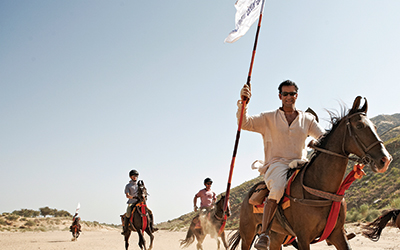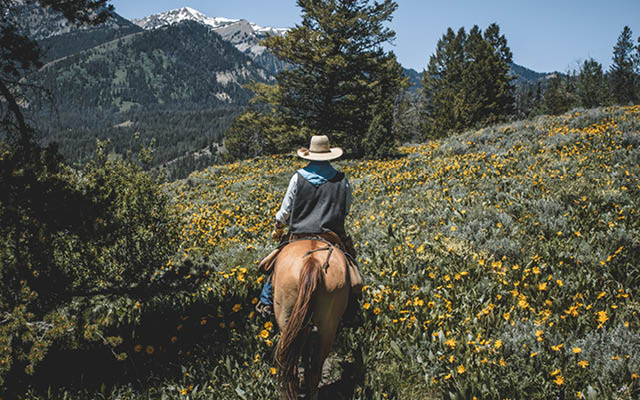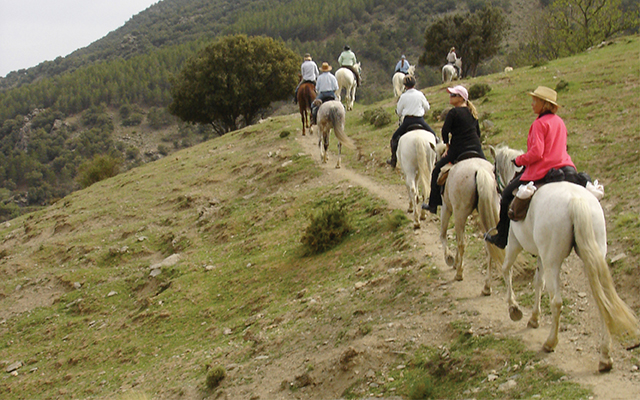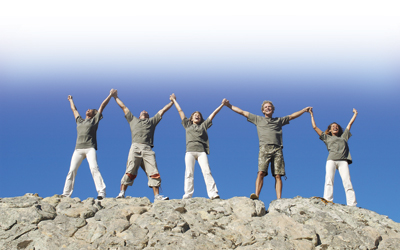A dozen Marwari horses wearing red-and-saffron saddlecloths and sashes canter through the dunes of India’s Thar Desert. Astride the lean Marwaris, an ancient breed of warhorse, are Relief Riders International volunteers. They lead a caravan of camel carts and jeeps bearing medical and school supplies for people living in desert outposts. As the group approaches a village, storm clouds gather and the riders struggle to control their thunder-spooked mounts.
“We were welcomed with a ceremony led by a one-eyed thakur, or lord, of the area,” recalls one rider, Los Angeles travel writer Andrew Mersmann. Women in saris sang; a man blessed the visitors by placing a dot of red paste on the foreheads of both riders and horses. “Suddenly the skies opened, and we were pelted with hail and heavy rain,” remembers the 48-year-old Mersmann. “It was like an epic movie: Outsiders cross the desert, bringing rain to end the drought.”
While that rain may have been a lucky coincidence, the goal of Relief Riders International (RRI) is indeed to bring relief, to provide a reprieve from scarcity in villages located far from the goods and services available in urban centers.
This U.S.-based, for-profit company offers a particularly exciting example of what’s known as “voluntourism”: in this case, a chance to travel and help others that includes a two-week horseback trip through India’s Rajasthan region.
“The magic of our rides is that they blend adventure travel and humanitarian efforts,” says RRI’s founder Alexander Souri, who organizes and rides on every excursion.
RRI’s mission is to serve people who live in villages remote from many resources. Few of the residents have ever seen a doctor or dentist. Many are malnourished. By age 50, some are nearly blind from cataracts caused by the desert sun.
To help out, RRI volunteers administer simple medications, demonstrate hygienic hand washing, provide milk goats to families who need them, and work in partnership with Indian Red Cross doctors and dentists to set up medical and dental camps that can treat hundreds of people in a single day.
The Relief Riders also work with translators to direct patients to the appropriate medical specialist and sometimes assist physicians with patient care. Since its inception in 2004, RRI has served more than 18,700 people in Rajasthan, India.
Serve the World on Vacation
RRI is among a growing number of voluntourism companies. Not all trips involve two weeks of spectacular horseback riding, but most organizations offer a chance to connect with an unfamiliar part of the world through service — which can be a richly rewarding way to experience new places.
“Volunteering can crack your heart open in amazing ways,” says Mersmann. His 2007 RRI trip helped him realize his passion for socially conscious travel, he says, and a year later, he began writing Frommer’s 500 Places Where You Can Make a Difference (Frommers, 2009).
Horse lover Charlene DeHaven, 63, a physician from Spokane, Wash., signed up for a Relief Riders trip six years ago because she “just had a feeling” that she and her partner Curtis, a nonrider, shouldn’t miss this particular adventure. And she was right. The couple still tell friends about their experience and stay in touch with fellow riders.
An expert horsewoman, DeHaven was nursing a knee injury, so she and her curly-eared Marwari rode in the “scenic” slower-paced group. The “advanced” group galloped, trotted and cantered. “Those horses were bred for the desert, and they could run all day,” she says, adding that the animals were treated with utmost care.
RRI welcomes riders of all abilities, but DeHaven cautions that the riding is vigorous, even for the slower group. Riders’ skills improve on the journey as less experienced equestrians receive instruction along the way. “By day 4, the ‘scenic’ group is usually doing a beautiful lope and keeping up with the faster group,” says Souri. If riders become tired, they can ride in a Jeep or camel-drawn cart.
Among DeHaven’s fondest memories of her trip is the “intense joy” of donating milk goats. Each rider had the chance to hand over a skittish nanny to a village resident, and both givers and receivers smiled through tears. For some of the families, she says, “owning a goat and drinking its milk can literally mean the end of hunger.”
RRI riders are often overwhelmed by the warm welcome they receive from village locals. The Hindu and Muslim villagers typically speak Rajasthani and other tribal languages, but translators are present to bridge the language gap and communicate messages of all kinds — from the details of a medical problem to statements of goodwill. Translators also help bridge the cultural gap, so volunteers don’t inadvertently disrespect local customs.
Both parties have a stake in overcoming any barriers to communication. “The medical need in the region is certainly great,” says Mahesh Arora, RRI’s executive medical director, who worked for 25 years in the Indian Red Cross Society. “In the interiors of Rajasthan, dental services are not available. Dental problems are very common. Cataracts, also very common, make day-to-day life miserable.”
He notes that many villagers can be quite tentative during their medical interactions (especially when they’re being screened for cataract surgery), but patients of all ages seem to really enjoy the RRI visitors and “love to interact and have a lot of fun with them,” says Arora.
The warm reception may also be due in part to a high level of anticipation in the communities receiving assistance. The news of a coming medical camp travels fast. “We print pamphlets and make banners to let everyone in the region know the dates,” says Souri. “But word of mouth is a very powerful medium in India.”
Giving Goes Both Ways
Although RRI trips have a humanitarian mission, they also offer the chance to experience a part of India that few non-native people ever visit — especially in relative comfort. Relief Riders stay on the outskirts of desert villages, sleeping on cots in roomy caravan tents with attached bathrooms that include a sit-down toilet, sink and shower. The expedition crew sets up the camp, a cook prepares traditional Indian meals and an equestrian team attends to the horses.
“RRI is special because you travel by horse at a pace that’s not a blur. You see, you stop, you interact with people,” says Isabella de la Houssaye, who has participated in two RRI trips and taken her young children on both. “You connect in a way you don’t on a whirlwind tour.”
The horses were a big draw for de la Houssaye’s children. “It’s easy to get kids excited about volunteer work when it’s mixed with the thrill of riding. And the other Relief Riders are excellent examples of people giving back during their free time,” says the 49-year-old international lawyer from Lawrenceville, N.J.
Most people who volunteer on vacation say they’re the ones who receive a great gift, and that’s true for more than just children who love horses. Jeremy Hoffman, a 27-year-old software engineer for Google, had little foreign-travel and essentially no horse experience, yet he joined his mother on an RRI trip to Rajasthan in 2012. He remembers the shock of going from his “predictable Silicon Valley life” to villages where no one knew or really cared about Google.
Hoffman didn’t necessarily love every minute of his time in India. While he enjoyed being greeted with unprecedented friendliness (schoolboys flocked to him and emulated how he wore his baseball cap), he also endured saddle soreness so severe he could hardly walk, and he wrenched his neck while learning to swing a cricket bat. Still, when he found himself shining a flashlight into patients’ mouths during tooth extractions when the dental-surgery light didn’t work, he realized he was having an experience that wasn’t going to be measured just by how many good or bad times he had.
“This trip opened my eyes to the fact that I could help in a way that was more meaningful than buying tchotchkes to support the local economy,” says Hoffman.
During his RRI visit, people with cataracts received a checkup from a volunteer ophthalmologist and were transported to a clinic, where their cataracts were removed. The surgery and follow-up appointment were free to patients because the organization covers the costs. For Hoffman, that creates a satisfaction few other vacations can match: “Because I went on a Relief Riders trip, there are people who can see again.”
Some might argue that greater good would be done if people simply donated money directly for humanitarian aid and skipped the vacation. But based on his own RRI experience, Hoffman disagrees. The immersion and adventure were both big parts of the equation for him; they resulted in amity and empathy that money can’t buy. He admits that he’d barely given a thought to India before his trip, but now he’s forged a permanent interest in the fate of the people of Rajasthan.
“For me, meeting these people, enjoying the beautiful desert, and finding the courage to canter on my horse were parts of a very real experience — not an abstraction,” he says. “I’ll be connected to India, these people and the problems they face, forever.”
Volunteer for Adventure
Whether you want to help people or the environment, your travels can make the world a better place.
- Relief Riders International: 16-day riding/humanitarian aid in India: $7,450. Includes all meals and accommodations. www.reliefridersinternational.com
- Cross-Cultural Solutions: Volunteer alongside members of a local community to address needs such as education or healthcare. $2,500 and up. www.crossculturalsolutions.com
- Biosphere Expeditions: Do conservation work worldwide to safeguard animals and wild places. $1,500 and up. www.biosphere-expeditions.org
- Earthwatch Institute: Join scientists in doing scientific field research, including studies of wildlife, habitats and archaeological sites. $500 to $5,200. www.earthwatch.org




This Post Has 0 Comments